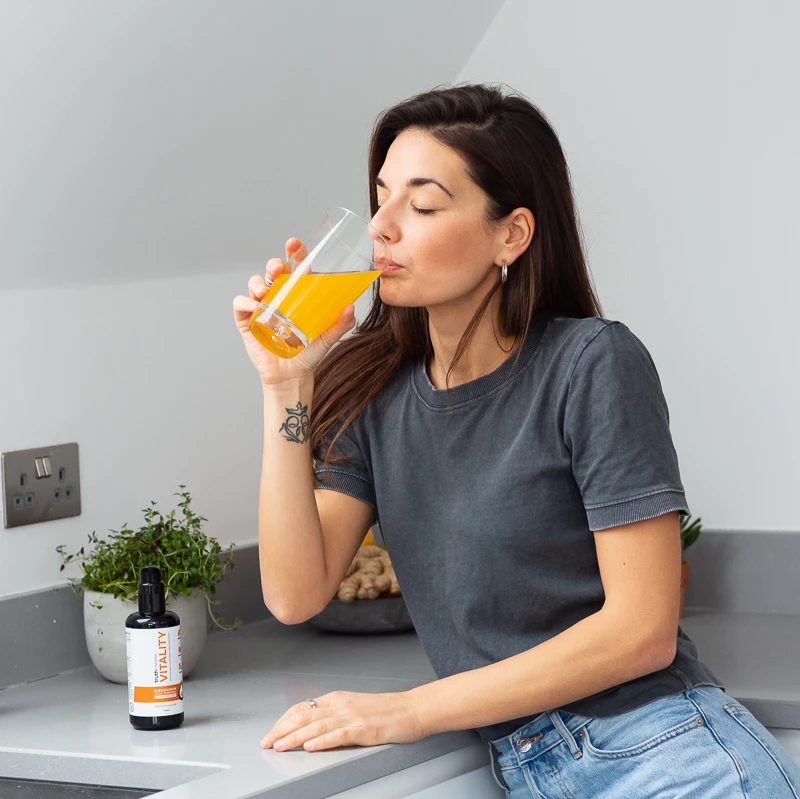Beat The Bloat
What could be causing your bloat & how you can reduce it
– Written by Orla N

Bloating can happen to anyone, at any time – it’s a really common ailment linked to multiple factors. When bloating happens out of the blue, it can be incredibly embarrassing, and can often be triggered by something as simple as eating a certain type of food that just doesn’t agree with you. Other common causes of bloating can be related to digestive issues, such as constipation, hormonal fluctuations, overgrowth of bacteria in our digestive tracts, and in rare cases, it can be caused by underlying illnesses. Whatever the cause, bloating can be incredibly embarrassing and lead to feelings of absolute despair when you don’t know what’s causing it, and just cannot pinpoint it!
Let’s have a look at some of the most common causes of bloating, and some of the remedies that can alleviate the discomfort associated with this condition, and some ways in which it can be prevented.

Most commonly bloating is linked to our digestive systems, and caused by a buildup of air or gas in our gastrointestinal tract. People who suffer from bloating will experience swelling in their abdominal area, as well as feelings of fullness or tightness. Bloating can be accompanied by burping, flatulence, stomach rumbling, and pain. Not only are the symptoms associated with bloating uncomfortable but they can also impact our abilities to go about our day as normal as well as the impact on our mental health when we experience them frequently. If you do suffer from bloating on a regular basis, it’s important to seek medical counsel from your GP to ensure it’s not a serious underlying health condition.
There are many different things that cause bloating triggered by our digestive systems, but probably the most common one is constipation. According to the NHS, constipation symptoms can include, not having passed faeces more than three times in a week, struggling to have bowel movements, and passing stools that are dry or hard [1]. Sufferers may also have a stomach-ache and feel sick, as well as suffering from bloating [2].
Another cause of bloating can be Irritable Bowel Syndrome (IBS), which causes increased sensitivity of the gut, those affected can suffer from stomach pain, bloating diarrhea, and constipation. According to the NHS IBS is usually a life-long problem and whilst there is no cure, often symptoms can be alleviated with dietary and lifestyle changes [3]. Other digestive ailments that can contribute to stomach bloating can include Small Intestinal Bacterial Overgrowth (SIBO), and Gastroparesis [4].
So what can you do to alleviate and prevent bloating related to the digestive tract?
#1 Look into your diet
One of the most successful forms of prevention is often linked to our diets, it can very often hold the key to some respite. Simple and recommended dietary changes can include, avoiding carbonated drinks, potentially steering clear of products that include lactose, avoiding chewing gum and avoiding foods that cause gas such as lentils and beans.
Some recommend the FODMAP diet – which is designed to avoid certain types of gas-producing foods that are Fermented by gut bacteria, such as [6]:
- Oligosaccharides: Fructans & GOS – found in foods such as wheat, rye, onions, garlic, and legumes/pulses.
- Disaccharides: Lactose – found in dairy products like milk, soft cheeses, and yogurts.
- Monosaccharides: Fructose – found in honey, apples, high fructose corn syrups, etc.
- And Polyols: Sorbitol and Mannitol – Found in some fruit and vegetables and used as artificial sweeteners.
We recommend going to a dietitian to get further nutritional advice.

#2 Try Probiotics
Probiotics are very important for those suffering with digestive issues, a recent systematic review of the efficacy of probiotics for treatment of for lower GI symptoms found ‘“moderate” evidence indicated that, in some patients with IBS, specific probiotics help reduce bloating/distension and improve bowel movement frequency/consistency [7]. Researchers of the review also found that ‘specific probiotics can relieve lower GI symptoms in IBS, prevent diarrhoea associated with antibiotics and H. pylori eradication therapy, and show favourable safety’ [8]. Probiotics can be found in greek yogurt and kefir and also be purchased over the counter from most health food stores.

#3 Try Curcumin if it’s IBS-related bloat
Dr Harry says “It’s no longer a secret that curcumin is a powerful, plant-based anti-inflammatory. Bundy and co-workers reported a2 5% improvement in pain and discomfort score after 8 weeks of taking a standardised turmeric extract[9]. Curcumin is the bioactive component of Turmeric.
Similarly, in a more recent study in which subjects were given a predominantly curcuminoid supplement (or placebo), investigators found significant and substantial improvements in IBS symptoms after 8 weeks(though in some, benefits occurred after 4 weeks) [10]. It’s fair to say that if you suffer IBS, curcumin is definitely worth a shot!”
Looking at the bigger picture, and longer-term answers, quite often we need to review our entire lifestyle, to achieve success with persistent digestive bloating. Meditation, more exercise, a healthier diet, decreasing alcohol consumption, and leading a more mindful lifestyle can all be contributing factors towards having a healthier body in the long term.
References
[1] https://www.nhs.uk/conditions/constipation/
[2] https://www.nhs.uk/conditions/constipation/
[3] https://www.nhs.uk/conditions/irritable-bowel-syndrome-ibs/
[4] https://www.hopkinsmedicine.org/health/wellness-and-prevention/bloating-causes-and-prevention-tips
[5] https://www.nhs.uk/conditions/periods/
[6] https://www.monashfodmap.com/about-fodmap-and-ibs/
[7] https://www.ncbi.nlm.nih.gov/pmc/articles/PMC5900870/
[8] https://www.ncbi.nlm.nih.gov/pmc/articles/PMC5900870/
[9]Turmeric extract may improve irritable bowel syndrome symptomology in otherwise healthy adults: a pilot study.Bundy R, Walker AF, Middleton RW, Booth J.J Altern Complement Med.2004 Dec;10(6):1015-8.
[10]Evaluation of Benefit and Tolerability of IQP-CL-101 (Xanthofen) in the Symptomatic Improvement of Irritable Bowel Syndrome: A Double-Blinded, Randomised, Placebo-Controlled Clinical Trial. Alt F, Chong PW, Teng E, Uebelhack R. Phytother Res. 2017 Jul;31(7):1056-1062.
LIKE THESE ARTICLES?
STAY UP-TO-DATE
Join the Truth Origins club to stay up-to-date on our latest articles, blog posts, updates and exclusive discounts. You’ll also receive 10% OFF your first purchase for joining.




